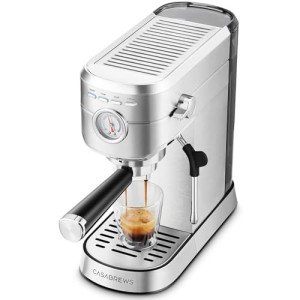Home Use Espresso Machines: A Comprehensive Guide
Espresso machines have ended up being a staple in numerous families as coffee enthusiasts look for to reproduce café-quality brews in the convenience of their cooking areas. The increase in appeal has caused a diverse market filled with numerous models, features, and costs. This short article aims to offer an informative summary of home use espresso machines, assisting readers browse their alternatives successfully.
Comprehending Espresso Machines
Espresso machines work by forcing warm water through finely-ground coffee under high pressure, resulting in a concentrated coffee drink called espresso. There are numerous types of espresso machines categorized based on their developing methods and level of automation. The most typical types include:
- Manual Espresso Machines: These require the user to manage the pressure and water flow, enabling a more hands-on coffee-making experience.
- Semi-Automatic Espresso Machines: These offer automatic control over water pressure, while the user manually grinds and tamps the coffee.
- Automatic Espresso Machines: With the push of a button, these machines instantly control the circulation of water, making it much easier to brew espresso with consistent outcomes.
- Super-Automatic Espresso Machines: These all-in-one machines manage grinding, tampering, brewing, and even milk frothing, making them perfect for users looking for benefit.
- Capsule or Pod Machines: These use pre-packaged coffee pods to develop espresso with minimal effort, however they limit choice in brewing methods and flavors.
Table: Comparison of Espresso Machine Types
| Type | Control Level | Ease of Use | Cleaning Level | Suitable For |
|---|---|---|---|---|
| Manual | User-controlled | Moderate | High | Coffee purists |
| Semi-Automatic | Partial automation | Moderate | Moderate | Home baristas |
| Automatic | Fully automated | Easy | Low | Busy individuals |
| Super-Automatic | Fully automated | Very easy | Extremely low | Convenience applicants |
| Capsule/Pod | Fully automated | Really easy | Really low | Casual drinkers |
Key Features to Consider
When picking a home use espresso machine, it's vital to think about numerous functions that can considerably affect the quality of espresso and user experience.
- Pressure: Look for machines that provide a minimum of 9 bars of pressure, as this is considered optimal for developing espresso.
- Boiler Systems: Single vs. dual boiler systems figure out temperature stability and the ability to brew espresso and steam milk at the same time.
- Grinder: Integrated mills permit for newly ground coffee, which enhances taste. Consider machines with adjustable grind settings.
- Milk Frother: For those who enjoy cappuccinos and lattes, a built-in steam wand or automatic frother is important.
- Size and Design: Consider your kitchen space and visual preferences. Machines are available in different sizes, from compact to big setups.
- Rate: Home espresso machines can range from a couple of hundred to a number of thousand dollars, so it's important to develop a budget before checking out options.
Advantages and disadvantages of Home Use Espresso Machines
| Pros | Cons |
|---|---|
| Convenience of brewing coffee in your home | Preliminary financial investment can be high |
| Quality of espresso is frequently remarkable | Requires some skill, especially with manual machines |
| Ability to explore tastes | Maintenance and cleaning can be labor-intensive |
| Can save cash in the long run | Not all machines will match every coffee choice |
Maintenance and Cleaning Tips
Maintaining an espresso machine is crucial for extending its life and guaranteeing consistent brew quality. Here are some beneficial ideas:
- Regular Descaling: Minerals from water can develop in the machine. Descale every 1-3 months, depending upon water solidity.
- Daily Cleaning: Rinse portafilters, baskets, and steam wands after each use to avoid coffee oils from building residue.
- Use Filtered Water: This can assist reduce mineral buildup and enhance the taste of coffee.
- Change Gaskets and Seals: These elements may wear out gradually and must be changed to keep pressure and efficiency.
- Check out the Manual: Each machine has specific care directions; following these will ensure durability.
FAQs About Home Use Espresso Machines
Q1: What is the very best budget espresso machine?The best budget espresso machine frequently depends upon specific needs, but designs like the DeLonghi EC155 or the Breville Bambino are popular amongst users for offering terrific value. Full Posting : How long do home espresso machines usually last?With correct maintenance, home espresso machines can last anywhere from 5 to 15 years, depending upon the quality of the machine and frequency of use. Q3: Can I make coffees and lattes with any espresso machine?While most espresso machines can make cappuccinos and lattes, having a dependable
steam wand or frother is essential for attaining the best milk texture.
Q4: Are super-automatic machines worth the investment?For those who focus on convenience and quick developing, super-automatic machines can be worth the investment, though they may do not have some customizability in brew strength and taste. Q5: What types of coffee beans are best for espresso?While individual preference contributes, beans identified as" espresso "blends are generally roasted darker, creating rich flavors and a creamy texture when brewed.
Purchasing a home espresso machine can change the day-to-day coffee regimen into something special, elevating home brews to café quality. By comprehending the various kinds of machines, essential functions to think about, upkeep needs, and weighing the
pros and cons, customers can make educated decisions that fit their specific preferences. As the espresso culture continues to grow, no matter the option, every brew can be a scrumptious experience waiting to be enjoyed.

